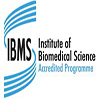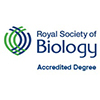Undergraduate Course
Biomedical Science BSc (Hons)
Immerse yourself in the world of Biomedical Science on a course with small class sizes and outstanding facilities, led by dedicated, experienced staff.
/prod01/yorksjacuk/media/content-assets/safe-images/1600-x-1000/Biomedical-Science-header.jpg)
Examine how different diseases affect the normal structure and function of the human body in our impressive Biomedical Science laboratories. Through this course you will gain the scientific knowledge and laboratory skills needed to investigate, diagnose, monitor and treat different types of disease.
- Available in Clearing
95% Biomedical Science students responded with a 95% positivity score for how well teaching staff supported their learning. (National Student Survey 2024)
95% Biomedical Science students responded with a 95% positivity score for how often the course is intellectually stimulating. (National Student Survey 2024)
York campus
- UCAS code – 7Y63
- Duration – 3 years full time, 4 years full time with placement, 6 years part time
- Start date – September 2025, September 2026
- School – School of Science, Technology and Health
Minimum entry requirements
112 UCAS Tariff points, including B in A Level Biology (or equivalent).
4 GCSEs at grade C/4 including English Language, Maths and Double Integrated Science (or equivalent).
Tuition fees
UK 2025 entry £9,535 per year full time
International 2025 entry £14,700 per year full time
Discover Biomedical Science
Student Story (Patrick, Biomedical Science)
Biomedical Science student Patrick discusses their time at York St John University.
Student Story (Olivia, Biomedical Science)
Biomedical Science student Olivia discusses their time at York St John University.
Discover Biomedical Science
Claire Wright and Rebecca Tadokera introduce us to Biomedical Science at York St John University.
Course overview
Biomedical Science is the study of human biology and disease. Throughout the course you will build scientific knowledge and learn how to investigate, diagnose, monitor and treat different human diseases, alongside developing practical laboratory skills.
On this Institute of Biomedical Science (IBMS) and Royal Society of Biology (RSB) accredited course you will investigate many different aspects of human biology and disease. This will mean studying the biology of disease at a tissue, cellular and molecular level to understand its structure and biological processes. This will give you detailed knowledge of what causes disease and how it affects us. Throughout your degree you will study a variety of pathological diseases. As you progress, you will explore:
- Genetics
- Cellular pathology
- Clinical biochemistry
- Clinical immunology
- Haematology
- Medical microbiology
- Several other clinical specialities
Our practical course gives you extensive laboratory experience. You will have lots of practical teaching sessions and can also access our laboratories in your own time. Academic and technical staff will supervise these sessions and support you as you learn. We also offer the opportunity for mentorships from students studying at a more advanced level of the course.
We have an extensive network with local NHS trusts and can help you find placements in the NHS and beyond. You can also choose a year long placement in an IBMS accredited laboratory. This extends the length of your course to 4 years and your award will become Biomedical Science (with Placement). During this placement you will complete the IBMS Registration Training Portfolio, and you will receive the IBMS Certificate of Competence which allows you to register with the Health and Care Professions Council (HCPC) as a Biomedical Scientist.
Course structure
Year 1
Our academic year is split into 2 semesters. How many modules you study each semester will depend on whether you are a full time or part time student.
In your first year, if you are a full time student, you will study:
- 2 compulsory modules across semesters 1 and 2
- 2 compulsory modules in semester 1
- 2 compulsory modules in semester 2
If you are studying part time, the modules above will be split over 2 years.
You can find out which modules are available in each semester on the Course Specifications.
Modules
Credits: 20
Compulsory module
On this module you will gain the skills that underpin the scientific methods and practice of biomedical science. These include the mathematical and statistical skills, scientific writing and comprehension, and study skills needed for laboratory work. You will also build transferable skills relevant to any future job, including team work, organisation and self-reflection.
Credits: 20
Compulsory module
This module will help you to develop your understanding of the normal organ systems. You can then compare this with disease states on other modules. You will study:
- The digestive system and nutritional requirements
- The nervous system
- The cardiovascular and respiratory systems
- The anatomy and function of the renal system
- The endocrine system in relation to developmental biology
Credits: 20
Compulsory module
On this module we will introduce you to the molecular structure of the main macromolecules in the body. You will:
- Learn to analyse how their structure affects their function
- Investigate the effect of solution conditions on reactions
- Explore the molecular structure of carbohydrates, nucleic acids, amino acids and lipids
- Articulate the effect of PH changes on biological molecules
Credits: 20
Compulsory module
On this module you will learn about cell structure and sub-structure, including the control of cell function, with a focus on mammalian cells. You will:
- Study the cell cycle and cell division, as well as cell specialisation and cooperation
- Study the intra- and inter-cellular structures of eukaryotic cells
- Determine the role of the cell cycle and associated common diseases
- Investigate cell differentiation and tissue specialisation
- Analyse and identify the structure of common tissues
Credits: 20
Compulsory module
On this module you will learn about how the various classes of biomolecules store and derive energy. We will also examine the main metabolic pathways and how these pathways function in an integrated manner in the living body. You will study:
- The normal metabolic pathways of carbohydrates, lipids and proteins
- Enzyme kinetics and inhibition
- The removal of toxins from the body
- The role of disruption of metabolic pathways in disease
Credits: 20
Compulsory module
On this module we will introduce you to microbiology, studying the structure, physiology, diversity, and genetics of bacteria and viruses. There is an emphasis on the classification of medically important organisms, and we will consider elementary concepts of immunology by exploring both the structure and function of the immune system, and the nature of antigens and antibodies. You will also:
- Examine the fundamental concepts of bacterial growth and metabolism
- Consider prokaryotic DNA replication, transcription and translation
- Explore epidemiology and prevention of disease
- Investigate the response of the immune system to infection
Year 2
In your second year, if you are a full time student, you will study:
- 2 compulsory modules across semesters 1 and 2
- 2 compulsory modules in semester 1
- 2 compulsory modules in semester 2
If you are studying part time, the modules above will be split over 2 years.
You can find out which modules are available in each semester on the Course Specifications.
If you choose to study this course with a placement year, you will complete your year in industry between Year 2 and Year 3. You will apply for your NHS or industry placement during your second year. The placement year is only available as a full time study option.
Modules
Credits: 20
Compulsory module
On this module you will focus on developing your employability. You will have sessions with the York St John University Careers team, as well as meeting biomedical science professionals and graduates. We will also introduce you to the methodologies used in biomedical science research, helping you to develop a range of analytical methods necessary to support your research project.
Credits: 20
Compulsory module
On this module you will learn about blood group antigens and antibodies, considering the important issues involved in the safe supply and testing of blood and its components. The module has a focus on disease analysis and the ethical consideration of immune-compromised patients. On this module you will:
- Examine the structure and function of the main components of the blood
- Explore the causes of blood based disorders, their diagnosis, monitoring and treatment
- Investigate the response of the immune system to infectious disease
- Study allergy and auto-immune diseases
- Investigate the genetic basis of blood groups
- Consider the ethics and appropriate selection of transfusion products
Credits: 20
Compulsory module
Address common biochemical disorders and their effect on the body at the molecular, cellular and organ level. Examine the nature of the clinical biochemistry laboratory, and consider the importance of the discipline in diagnosing and monitoring disease, including major biochemical tests. You will also
- Learn about the techniques used to analyse patient samples
- Examine the importance of internal and external standardisation of laboratory practice
- Consider the use of biochemical markers in cancer and routine organ function tests
- Study the causes, monitoring and treatment of diabetes
- Analyse the role of lipoproteins in health and disease
- Explore the role of the renal system in fluid and acid/base balance
Credits: 20
Compulsory module
On this module you will consider the structure and function of prokaryotic and eukaryotic genomes at the molecular level. Gain theoretical and practical experience of molecular biology laboratory techniques and clinical applications of modern molecular tools. You will also:
- Study the replication, transcription and translation of DNA
- Examine the role of mutation and genetic recombination
- Explore the use of molecular biology cloning techniques
Credits: 20
Compulsory module
This module focuses on the role of medical microbiology in the diagnosis and control of infectious diseases. You will study the characteristics of pathogens, their modes of host interaction, and their transmission. The modules also involves exploring their mechanisms of infection and growth using examples of viruses, prokaryotic and eukaryotic microbes. Alongside this you will:
- Investigate the isolation and identification of important human pathogens
- Analyse invasion strategies of micro-organisms
- Evaluate treatment strategies for infection, vaccination regimes and anti-microbial resistance
- Consider infection control and public health microbiology
Credits: 20
Compulsory module
This module provides an overview of the normal histology and cytology of the major organs and systems of the human body. You will develop the skills needed to collect, process, prepare and interpret samples from diseased tissue, as well as learning about commonly used laboratory techniques that provide evidence to help clinicians with the diagnosis of disease. This will include:
- Investigating the responses of inflammation, tissue repair and wound healing
- Assessing techniques in sample preparation and staining of histological samples
- Exploring the normal pathology of the major organs
- Considering the pathological changes associated with tumourigenesis
Year 3
In your third year, if you are a full time student, you will study:
- 1 compulsory Research Project module across semesters 1 and 2
- 2 compulsory modules in semester 1
- 2 compulsory modules in semester 2
If you are studying part time, the modules above will be split over 2 years.
You can find out which modules are available in each semester on the Course Specifications.
Modules
Credits: 40
Compulsory module
On this module you will investigate a specific area of scientific research which interests you. To do this you will work independently on a research project with the support of your academic supervisor. They will meet with you on a 1 to 1 basis and together you will design the experimental procedures for investigating your hypothesis. You will start by reading and reviewing relevant literature to generate hypotheses and research questions, before going on to collect your data in our laboratories using contemporary research methods. Once you have generated the data, you will analyse and interpret your complex data and write up your findings.
Credits: 20
Compulsory module
This module involves a detailed consideration of cancer biology, focusing on the basis of carcinogenesis and the molecular, cellular and physiological signs of cancer. On this module you will:
- Explore specific causes of cancer
- Review the scientific discoveries that have informed our understanding of the signs of cancer
- Investigate oncogenes and tumour suppressor genes and their effects
- Analyse the basis and scope of current cancer treatments
- Use bioinformatics to monitor response to treatment and development of resistance
Credits: 20
Compulsory module
On this module you will learn in detail how variation in the human genome contributes to disease. To do this you will:
- Explore errors in the molecular mechanisms responsible for gene expression linked to specific diseases
- Analyse how genetic diseases are inherited and how inheritance is predicted
- Evaluate single gene disorders, multifactorial diseases and genetic linkage
- Explore advances in genetics that are driving forward research into novel treatments
- Investigate the use of bioinformatics and genetic databases
Credits: 20
Compulsory module
On this module you will draw together many of the pathology disciplines you have previously studied. Study organ, cellular, molecular and clinical aspects of major human diseases. This includes:
- Neurodegenerative disorders
- Sepsis
- Diabetes
- Cardiovascular disease
- Chronic obstructive pulmonary disease
As you explore these disorders, you will analyse the biological basis, clinical presentation and treatment of important diseases. You will also evaluate the aetiology, diagnosis and treatment of several serious medical conditions.
Credits: 20
Compulsory module
On this module you will explore the underlying principles of pharmacokinetics, pharmacodynamics, and toxicology, and consider these in terms of the targets and mechanisms of drug action. As part of the module you will:
- Interpret molecular and cellular interactions related to the pharmacological and toxicological effects on patients
- Analyse the biological basis of drug delivery, metabolism and elimination from the body
- Evaluate the effectiveness of drug treatments, including personalised medicine
- Investigate the biotransformation of substances and toxicology
Teaching and assessment
Teaching and learning
Your modules will increase in complexity as you progress through your degree. You will learn through:
- Lectures
- Workshops
- Practical classes in our labs
- Participation in research studies
Each module runs on the same day each week, and you will study one subject each day. Your contact hours will vary each week but each module you study usually has 2 to 4 hours of contact time each week. We schedule our taught sessions between 9.00am and 5.00pm, Monday to Friday.
You will need to conduct independent study outside of this time. This might include reading, research and coursework preparation. Supervised access to the laboratories outside is available of your contact time, with technicians available to support these sessions. You will also have regular academic tutorials in which you can receive feedback on your work and discuss the course content.
Assessment
Assessment types vary from module to module. Some of your assessments might include:
- Report writing
- Practical competency test
- Written and oral exams
- Scientific writing
- Presentations
- Data analysis and interpretation
For each assessment you will have a practice assignment before your formal submission. Each assessment is marked and returned with feedback so you can improve your academic and technical skills.
Career outcomes
Your future with a degree in Biomedical Science
This course will give you the lab experience and scientific knowledge you need for a variety of clinical or research careers. The extensive laboratory skills, as well as the transferable skills you gain in data analysis and interpretation and problem solving, could also prepare you for a range of other non-laboratory-based roles in related industries.
This degree could be the first step toward your career as a:
- Biomedical scientist
- Academic researcher
- Biotechnologist
- Forensic scientist
- Laboratory technician
- Research technician
Discover more career options on Prospects careers advice pages.
PGCE at York St John University
Further your education and work towards a rewarding career in teaching by studying for a Postgraduate Certificate in Education (PGCE) after you graduate. For over 180 years, we have worked with enthusiastic individuals who want to shape the future of young people across both primary and secondary school settings. You'll spend a lot of time in schools, developing your practice by teaching. You will graduate with Qualified Teacher Status and become part of the well respected alumni of York St John educators.
Alumni stories
Visit our YSJ Snapshots blog to see what our past students from across the University have done with their York St John degrees.
Whatever your ambitions, we can help you get there.
Our careers service, LaunchPad, provides career support tailored to your ambitions. Through this service you can access:
- Employer events
- LinkedIn, CV and cover letter sessions
- Workshops on application writing and interview skills
- Work experience and volunteering opportunities
- Personalised career advice
This support does not end when you graduate. You can access our expert career advice for the rest of your life. We will help you gain experience and confidence to succeed.
Entry requirements
Qualifications
Minimum entry requirements
112 UCAS Tariff points, including B in A Level Biology (or equivalent).
4 GCSEs at grade C/4 including English Language, Maths and Double Integrated Science (or equivalent).
Calculate your UCAS Tariff points
Your 112 UCAS points can be from the following qualifications:
| Qualifications accepted | Minimum grade | Minimum science requirements |
|---|---|---|
| A level (A2) | BBC (excluding General Studies) | B in Biology. An AS or A2 in Chemistry is desirable. If you have CCC in all science subjects, we will consider your application. |
| BTEC Extended Diploma | Distinction, Merit, Merit | A science based BTEC or 3 biology specific modules |
| International Baccalaureate | 30 points | A grade 5 in Higher Level Biology |
| Access to Higher Education Diploma | 45 credits at level 3 and completed within 2 years | Access to Science, Medicine or Health Diplomas are preferable. Broader Diplomas must include, 3 modules in Biology. |
| T-level | Merit or above | T-Level must be in Science |
We do not accept Adult Numeracy or Key Skills instead of GCSE Maths.
International students
If you are an international student you will need to show that your qualifications match our entry requirements.
Information about international qualifications and entry requirements can be found on our International pages.
If English is not your first language you will need to show that you have English Language competence at IELTS level 6.0 (with no skill below 5.5) or equivalent. By the end of your degree your English language competence is expected to be at IELTS level 7.0 equivalent, and the University will assess this.
International entry requirements
Mature learners
If you do not have standard academic qualifications, you will need to demonstrate an equivalent level of knowledge. You can show this through continued professional development (CPD) certificates or work based portfolios. You will also need to attend an interview as part of the recruitment process.
Entry through Recognition of Prior Learning
You may also be able to access the Biomedical Science degree through Recognition of Prior Learning.
You may be able to join the course in year 2 or 3 if you have secured the relevant number of credits (120 per year) and completed the required learning in your previous institute. You will be required to send transcripts of your studies completed so far for a mapping exercise of your modules to be conducted by a member of the academic team and allow a decision to be made.
If you would like to apply for transfer to the Biomedical Science degree at York St John University, please complete the gecko form here.
Terms and conditions
Our terms and conditions, policies and procedures contain important information about studying at York St John University. You can read them on our Admissions page.
Fees and funding
To study for an undergraduate degree with us, you will need to pay tuition fees for your course. How much you pay depends on whether you live inside the UK, or internationally (outside the UK).
Tuition fees are reviewed annually and may be increased in line with inflation, prior to the start of each academic year, and subject to the fee cap set by the UK government. Such increases to fees will be at the Retail Price Index (RPI) forecast rate, as advised by the Office for Budget Responsibility and the Office for Students. The only exception to this would be where government legislation deems otherwise.
If a rise in the tuition fee becomes necessary, we will endeavour to inform you as soon as possible and we will explain the reason(s) for the increase. Any tuition fee increase will only be applied from the start of the next academic year and will not be applied 'in year'.
UK 2025 entry
The tuition fee for 2025 entry onto this course is:
- £9,535 per year for full time study
- £7,145 per year for the first 4 years if you study part time
These prices apply to all UK, Jersey, Guernsey and Isle of Man students
You can find out more about funding your degree by visiting our funding opportunities page:
Placement year funding
If you choose to take a placement year, and your course offers it, you can apply for the Tuition Fee and Maintenance Loan for your placement year. How much you are awarded is based on the type of placement being undertaken and whether it is a paid or unpaid placement. The tuition fee for your placement year will be reduced.
Tuition fees
UK 2025 entry £9,535 per year full time
International 2025 entry £14,700 per year full time
International 2025 entry
The tuition fee for 2025 entry to this course is £14,700 per year for full time study.
This price applies to all students living outside the UK.
Due to immigration laws, if you are an international student on a Student Visa, you must study full time. For more information about visa requirements and short-term study visas, please visit the International Visa and Immigration pages.
Find out more about funding your degree:
Additional costs and financial support
There may also be some additional costs to take into account throughout your studies, including the cost of accommodation.
Course-related costs
While studying for your degree, there may be additional costs related to your course. This may include purchasing personal equipment and stationery, books and optional field trips.
Study abroad
For more information on tuition fee reductions and additional costs for studying abroad, please visit our study abroad pages.
Accommodation and living costs
For detailed information on accommodation and living costs, visit our Accommodation pages.
Financial help and support
Our Funding Advice team are here to help you with your finances throughout your degree. They offer a personal service that can help you with funding your studies and budgeting for living expenses.
For advice on everything from applying for scholarships to finding additional financial support email fundingadvice@yorksj.ac.uk.
Course highlights
IBMS and RSB Dual Accreditation
Our course has dual accreditation from the Institute of Biomedical Science and the Royal Society of Biology. This means you will gain the broad scientific knowledge and current technical skills necessary for professional laboratory work.
Outstanding laboratory facilities
You will have access to our teaching laboratories, bespoke scientific equipment and research laboratories. Your practical classes are taught in these spaces and you can access them outside of contact time under supervision.
1 year placement in the NHS
You can choose to apply for a year-long NHS placement in an IBMS approved laboratory between year 2 and 3. This will give you the necessary qualification to start your career as a biomedical scientist.
Disease Detection and Prevention Group Research Group (DDaP)
Through this group we conduct wide-ranging exciting research under the umbrella of the DDaP Research Group. We undertake targeted and applied biomedical science research, focusing on diverse ways to improve human health including cancer, infectious diseases, genetics, and biomarkers of disease. Our team consists of academics, technicians, national and international partners, and past students enrolled in Masters by Research or Doctorate (PhD) courses.

Amber Biomedical Science
The range of modules covered means there are many scientific fields I can pursue a career in: from working in a hospital lab studying transfusion science to teaching or working in industrial laboratories like FERA. gaining certification in specialist scientific equipment like spectrophotometers, and becoming skilled in microscope work ,shows potential employers the skillset you have.
Migle Biomedical Science
Human anatomy has been my passion for many years and I am fascinated with learning how living organisms work on the molecular level. My favourite time is in the laboratories and practical application of the theory - something that can sound complicated on paper but can be easy visualised in the practical sessions.
Ben Biomedical Science
The small cohort size provided a comfortable atmosphere to ask questions and participate. The teaching is fantastic and enthusiastic; they make very complicated topics interesting, accessible, and applicable for both employment and further studies.



/prod01/yorksjacuk/media/content-assets/safe-images/1600-x-1200/Carousel-2.jpg)
/prod01/yorksjacuk/media/content-assets/safe-images/undergraduate-course-pages-2021/carousel-1600x1200/2-11-18-YSJ-0494.jpg)
/prod01/yorksjacuk/media/content-assets/safe-images/undergraduate-course-pages-2021/carousel-1600x1200/25-10-16-York-St-John-Uni-0600.jpg)
/prod01/yorksjacuk/media/content-assets/safe-images/1600-x-1000/Biomedical-Science-research-group.jpg)

/prod01/yorksjacuk/media/content-assets/safe-images/500-x-500/YORK-SHOTS---WEB-23-(1).jpg)
/prod01/yorksjacuk/media/content-assets/2019-courses/decision-day.jpg)
/prod01/yorksjacuk/media/content-assets/safe-images/500-x-500/why-choose-YSJ-500x500.jpg)
